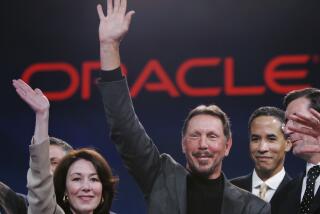MasterCard Picks 1st Interstate Bank Executive for Chief
MasterCard International turned to a senior First Interstate Bank executive Thursday to take its top post and move the credit card giant out of its runner-up position.
Alex W. (Pete) Hart was elected president and chief executive of the No. 2 credit card company by MasterCard’s board at a meeting in Palm Springs. Hart, 48, will resign as executive vice pr1702062436First Interstate in Los Angeles.
He replaces Russell E. Hogg, MasterCard’s president since 1980. Hogg resigned abruptly in July after a dispute with the board over the high level of expenditures, according to industry analysts.
“Hart is a very tough manager, and I think he is going to tighten up on spending and cut out a lot of frills,” said H. Spencer Nilson, publisher of a Santa Monica newsletter on the industry, who predicted Hart’s selection several weeks ago.
The MasterCard board has already decided to stop leasing a one-bedroom apartment at the expensive Trump Tower in New York that Hogg used for entertaining.
“We expect to run a very trim shop and a very cost-effective shop,” Hart said in a telephone interview from Palm Springs. “There are few excesses within the banking industry these days, and there will be few at MasterCard.”
MasterCard, a nonprofit corporation, lost its status as the industry leader to Visa International in 1979. Despite gains in some areas, the company has been unable to close the gap with its archrival in terms of volume and number of cards. Visa has about 60% of the U.S. bank card market, compared to MasterCard’s roughly 40%.
May Reverse Increase
Problems increased this summer when merchants who accept MasterCard were angered by plans to increase the fee that the merchants pay to banks issuing the cards.
Hart said MasterCard’s directors, from 26 big banks around the world, are considering a reversal of the increase at the meeting in Palm Springs this week. Industry insiders expect the board to decide to either cut or eliminate the increase.
During his tenure, Hogg was credited with many marketing successes, including the introduction of the industry’s first premium “gold” card in 1981. But he had difficulty retaining the strong managers needed to compete in the increasingly competitive credit card arena because he refused to delegate authority, Nilson said.
Hart, who is expected to earn more than $500,000 a year, will head a drastically overhauled management team at MasterCard’s New York headquarters. In the past three months, outside executives have been hired to run marketing and operations and a new chief financial officer has been appointed.
“My earliest concern is that we knit the team together,” Hart said. “I’m anxious to really help crystallize this into a well-directed team with a firm sense of direction for the company.”
MasterCard anticipates a gross volume of $150 billion in 1988, a 25% increase over last year, but it will still lose money for the second year in a row. In addition to its rivalry with Visa, MasterCard faces new competition from Optima, a card that has grown substantially since it was introduced by American Express about two years ago.
Hart, a MasterCard board member since 1983, will be replaced as vice chairman by William F. Zuendt, vice chairman of Wells Fargo in San Francisco.
During a decade at First Interstate, Hart was chairman of the bank-franchising subsidiary, head of its bank card division and chief executive of its data processing unit. His position as head of consumer banking made him one of the senior executives at the company.
“It was not an easy decision to leave First Interstate,” Hart said, “but this was an opportunity that was just very compelling, and there comes a time when you want to run your own shop.”
More to Read
Inside the business of entertainment
The Wide Shot brings you news, analysis and insights on everything from streaming wars to production — and what it all means for the future.
You may occasionally receive promotional content from the Los Angeles Times.










